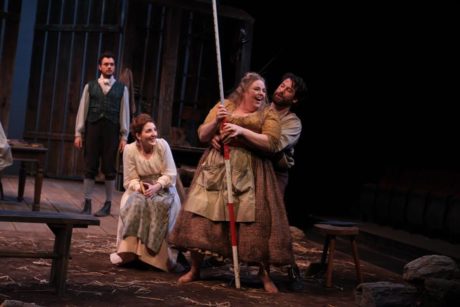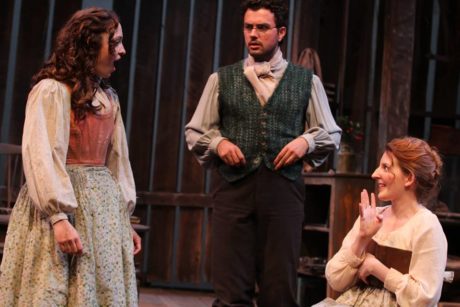One hundred years ago a group of Irish poets, musicians and classical scholars rebelled against English rule. The “Easter Uprising” was cruelly subdued by the occupying British, but this being Ireland; the Rebellion is memorialized through ballads, poems and plays. Villanova University honors this anniversary with a production of Brian Friel’s great Translations. Friel’s astonishing output includes the oft-presented classics Philadelphia Here I Come and Dancing At Lughnasa. Translations is a much more difficult but no less brilliant work. Thanks are due Villanova for letting us see it again.

When Translations premiered in 1980 in the Northern Town of Derry, (often called Londonderry), the Irish Language was nearly dead. Only a few counties near Galway could remember this fine melodic tongue. Set in 1833, everyone in the town of Baile Beag (referred by the English as Bally Beg) speaks Irish (Gaelic). But the English are coming. In addition to mapping the area, they will rename all of the towns and landmarks with names they can pronounce. Leitir will become LetterKenny and Cnoc Ban will translate to Fair Hill.
The setting is a dilapidated barn used as a hedge school, where self taught masters teach the peasants basic reading, mathematics, and the great Latin and Greek Classics. Enter two British surveyors, little knowing of the cultural destruction they are introducing. They miserably to convey to the people that they are gifting them with great civilizing favors. The year 1833 is the beginning of the end for the ancient culture. Within months, the hedge school will be replaced by a national school conducted solely in English. Irish audiences would react fearfully to Friel’s foreshadowing of the upcoming potato famine, “the sweet smell of the blight,” and the resulting “clearing of the land.” The English officer actually uses the word “eviction,” a soon-to-become terrible appellation in Irish history.
This is a play about the beauty and loss of language, and Friel is a poet worthy of the mantle of Joyce, O’Casey, and Beckett. Translations is shot through with brilliant observations of the excellent oddities of the Irish populace. The two old coots, steeped in “The Iliad” and “The Aeneid,” and well played by Barry Brait and Kevin Esmond, proudly recount how, as young men, they walked for miles to join the army of Wolfe Tone. They couldn’t find him and ended up in the pub.
Friel’s themes have had some success in today’s Ireland. Most signs in the south are written in both English and Gaelic, and a large-scale effort to teach the language is underway. I remember sitting in a Dublin Pub as the crowd watched a televised modern sitcom completely in the Irish language. Everyone but me understood it. Friel’s brilliance is further underscored by writing the play entirely in English, but amazingly, making it clear to the audience when the peasants are speaking Gaelic.
This is a heavy burden for a group of young Americans to assume, and there are difficulties. The accents capture the lilt and feel of the dialect, but the inconsistencies make it difficult to believe that these are longtime residents of the same isolated town. It is painful for an Irish actor to take a simple step in a Friel play, as he must bring to each stride yards and years of turf and tradition. Ireland is a land of poetry and legend, and every inhabitant seems to have been “raised on song and story.” The depth and agonized emotion of Irish acting can put American “method” actors to shame. It is not surprising then that the best Villanova performances come from the “fish out of water” characters.
Dan Cullen as the English Captain is recklessly condescending to the country folk, and draws big laughs when he thinks he can communicate in a foreign language by merely yelling and making ridiculous faces. Chris Monaco plays Owen, who grew up in the village, lived in Dublin, and having mastered English, has now been hired as an army translator. He realistically depicts the confusion of a man caught between two cultures, and it’s moving when he reads out the names of the local towns followed by their inept translations.
Sean Connolly as the younger Lieutenant, recognizes that Ireland has more beauty and charms than his gradually industrializing home in England. He wants to learn the language, but is comically frustrated by his inability to grasp the subtleties. He cannot understand that Owen, his translator, does not have the English name Roland, or that the girl he loves, Maire (Amanda Coffin), is not pronounced Myra. Friel pulls off a theatrical coup in the great love scene. The moment is written entirely in English, yet the audience understands that she speaks only Gaelic and that they continually misunderstand each other. He wants to abandon England and take up life in Ireland. She only dreams of getting out of her provincial village and traveling to New York. Since the actors achieve only the minimum of the passion and agony of the situation, the scene plays more for laughs and is less memorable.

The scenic design and lighting of Jerold R. Forsyth features what seems to be a ton of dirt imported to the Vasey stage. Still, the room looks like a well-planned stage setting rather than the realistic barn of the period. The same is true of Janus Stefanowicz’s costumes, which are beautiful but selectively distressed. The overall effect is an operetta Ireland, as seen through the eyes of The Quiet Man, The Bohemian Girl, or Darby O’Gill.
Translations at Villanova achieves a lot. Director Valerie Joyce has cleanly staged it and tries to make sense of the difficult to follow plot. Who exactly are the Donnelly twins? Patrons new to Irish history and culture should arrive early to study dramaturg Elise D’Avella’s excellent program notes that offer an informative history lesson.
The students have gained much by their study of this play. I remember once attending a production of a Neil Simon play in Belfast performed by Irish actors, who made America seem as far away as Mars. This production is much better than that.
Villanova recently signed an agreement of collaboration with Dublin’s Abby Theatre. Perhaps we will soon have ‘Nova actors on the Abby stage, with Philadelphia plays directed by native Irish directors. he future looks bright.
Running Time: Two hours and 30 minutes, including an intermission.
Translations plays through April 24, 2016 at the Vasey Hall Theatre of Villanova University – 800 East Lancaster Avenue, in Villanova, PA. For tickets call (610) 519-7474, or purchase them online.




